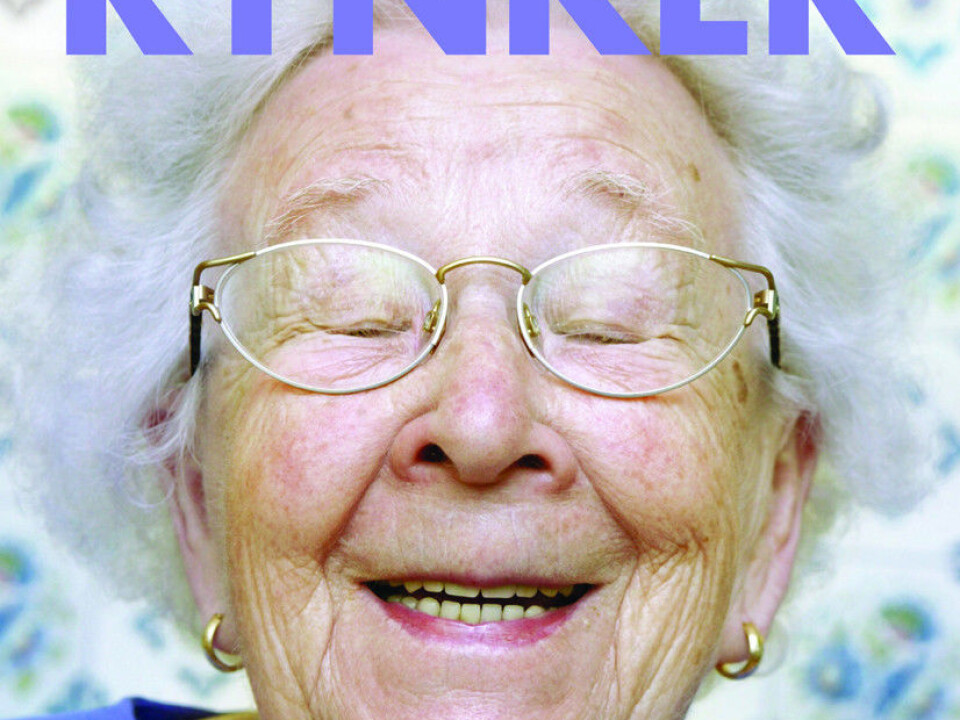This article was produced and financed by Lillehammer University College

Laughing away myths about old age
Researcher uses humor to bust myths about old age and the elderly.
Denne artikkelen er over ti år gammel og kan inneholde utdatert informasjon.
For 25 years Øystein Nøhr has collected jokes, funny stories, anecdotes and sayings about the elderly and about aging, while working as a researcher in social gerontology at Lillehammer University College.
"This has given me material for three books and provided light-hearted jokes to spice-up many a lecture," Nøhr says.
He has come across some of the material in conversations and meetings with older people. Reading has been another source, and some of the quotes, jokes and stories are translated from other languages. The texts are a lot of fun, but also contain wisdom from people with considerable life experience.
Busts myths about the elderly and old-age
"I want my books to do more than make people laugh, I also want to bust what I call myths about the elderly and old-age," says Nøhr, who thinks there is far too great a distance between how most elderly people experience aging and living their lives and what most people think the elderly are like.

"In my lectures it is important to get across that most elderly people live very good lives. At least if they are in good health," he says.
Surveys show that half of those asked believe that people who are 80 years of age or older are so frail that they need to live in nursing homes. The fact is that this is only true for one in ten.
Those asked also believed that between 70 and 80 per cent of old people experience loneliness. Studies of living conditions for this age group show that this is the case for 30-35 per cent.
"In a survey for which I was responsible, we found that feelings of loneliness among retirees were lowest for those who were 90 years old or older," the researcher says.
Health surveys show, for example, that only every 6th person over 80 years of age considers his or her health to be poor and that 6 out of 10 say that their health is very good. Only 1 of 15 in this age group needs care, while 1 of 8 receives at-home care.
The need to plan for a healthy old-age
In Sweden researchers have compared new cohorts of 70 year-olds to previous cohorts, and the results show that the new cohorts are healthier than the previous ones. A more extensive need for care does not appear until people approach 85 years of age. Elderly in ill health do not constitute the main picture.
"Politicians, as well as everyone else, should plan for a healthy old-age, not just one of illness and poor health," the researcher emphasizes.
"It is possible to rehabilitate and habilitate old people up to 100 years of age if they are met with the right attitudes and the right knowledge."
The many facets of aging
Nør's newest book, which is called "laughter lines" in Norwegian, is divided into more than 20 topics and shows that aging has many facets. Words of wisdom about sagacity and life experience are central, as are love and friendship.
Different perspectives on the aging of women and men are also included. There is an emphasis on women’s perspectives and on bodily changes in particular.
Many have tried to define when old-age starts and how one faces it with dignity. Many have also had something to say about wrinkles that appear and hair that disappears.
A lot to learn
Nøhr became interested in the elderly and in aging when he was collecting data for his master’s thesis in the early 1980s.
He then visited about 150 households in the municipality of Rendalen in order to examine what it was like to grow old in a sparsely populated municipality which women and youth were moving away from.
"In most cases we ended up having really good conversations that ranged far beyond my study," Nøhr explains.
"I found the elderly to be good story tellers who had a lot of life experience to share. I have carried this experience with me through the years. I recommend that everyone visit a retiree or invite one home for a good meal!"
"To briefly summarize what I have learned from the elderly: Cherish the possibilities that life offers you, do things you think you might regret later, take good care of your health, collect good friends, maintain your playfulness and joy of life as long as you can."
-------------------------------
Read the Norwegian version of this article at forskning.no
































